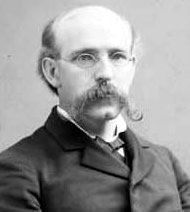
|
Terence Vincent Powderly (1849-1924), general master workman of the Knights of Labor, was born in Carbondale, Pa. Apprenticed as a machinist, he moved to Scranton and joined the International Machinists and Blacksmiths of North America in 1871, becoming president of his local and an organizer in Pennsylvania. Fired and then blacklisted for his labor activities, Powderly joined the KOL in Philadelphia in 1876. He soon organized and led a local assembly of machinists and in 1877 he helped organize KOL District Assembly 5. The next year Powderly was elected mayor of Scranton on the Greenback-Labor ticket and served three two-year terms. In 1878 Powderly played a major role in calling the first KOL General Assembly (a national convention). Elected grand worthy foreman, the |
|
second highest office, he was elected grand master workman (the highest office) when the General Assembly met the following year. As a labor leader he favored the organization of workers into mixed locals rather than craft unions, recommended that they avoid strikes, encouraged producers' cooperatives, and espoused political reform. An ardent advocate of temperance and land reform, Powerly was also active in the secret Irish nationalist society Clan na Gael.
|
Powderly was admitted to the Pennsylvania bar in 1894 and in 1897 President William McKinley appointed him U.S. commissioner general of immigration a position he held until 1902. In 1906 President Theodore Roosevelt appointed him special representative of the Department of Commerce and Labor to study European immigration problems. Powderly was chief of the Division of Information in the Bureau of Immigration and Naturalization from 1907 until his death. |
Read an 1883 interview with Powderly
Read Powderly's description of his experience with the labor movement
Read Powderly's "Plea for Eight Hours"